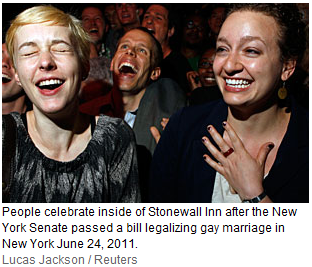
Region: USA & Worldwide
Many New Yorkers were out on the streets on Friday, June 24, in a massive and flamboyant demonstration. People were celebrating a new state law which would enable gay people to be formally married. But it seems that this time there was more at stake – the unbridled and progressive spirit of the city was embodied in an alliance of the liberal gay movement, gay lobbies, intellectuals, Democrat governor Andrew Cuomo and some less-conservative-than-expected Republicans, who together won an historic battle for the whole of America.

When the bill was passed in the Senate, New York was only the sixth state in the USA, albeit the most populous of them, to accept same-sex marriages. The victory is even more significant given that the Senate is Republican-controlled.
While gay lobbies were quick to emphasise the importance of the step in the context of Federal law, where the 1996 Defense of Marriage Act still bans gay marriages, ultra-conservatives announced a political mobilisation and launched a witch-hunt against ‘betrayers’ on all sides. Some of them are even seeking the defeat of New York Republicans who supported the bill.
The position of President Obama on the issue was uncertain. On the one hand he pointed out, when speaking to the Democratic Party Lesbian, Gay, Bisexual and Transgender (LGBT) Leadership Council, that his standpoint had evolved; on the other, gay lobbies reprimanded him for being opportunistic and not clearly and firmly supporting legalisation at Federal level.
New York’s new statute, though undoubtedly a positive move towards genuine social diversity, has once again demonstrated the sensitivity of media coverage of the issue. Some gay activists criticized journalists on their forums and blogs, many of them – even from the most liberal media – for using the phrase “gay marriage”. They emphasise that this phrase could puzzle the audience and introduce a new form of discrimination, because it could imply that gay marriage is something specific and different from heterosexual marriage, in terms of both law and social practice. In other words, gay marriage could be seen as a new category of marriage – legal but not equivalent to heterosexual marriage.
While the debate is still going on and many different aspects of the law are yet to be analysed, the law itself is undoubtedly a giant step for gay people, and for American society as a whole in respect of human rights, genuine diversity and equality. Nevertheless, one group of prominent gay intellectuals are indifferent or even hostile to the legalisation of same-sex marriage. They point out that marriage as an institution is a repressive and out-dated social form. Since marriage is based on heterosexual norms of domination, they argue, the gay population would lose its freedom and specific social space by embracing the institution.
Radman Selmic for Media Diversity Institute